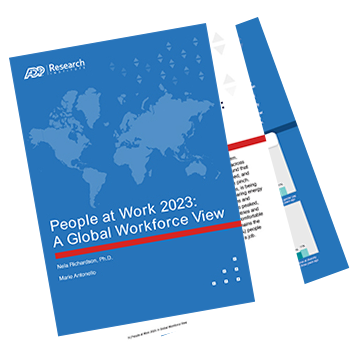What do workers want and how can you deliver it?
Following one of the largest global surveys of its kind — undertaken between 28 October and 18 November 2022 — ADP Research Institute® brings you vital intelligence into the attitudes, aspirations, wants and needs of 32,612 workers in 17 countries, including 8,613 working exclusively in the gig economy.
How you can benefit from this research:
- Discover what your employees might really be thinking
- Adapt your approach to people recruitment, reward and retention
- Apply the findings to drive your business transformation
What employees want you to know:

Job satisfaction
While 87% feel optimistic about the future, 62% think no sector will escape the effects of the current economic uncertainty and almost four in 10 (37%) don’t feel secure in their jobs.

Pay and benefits
61% say salary’s the key factor in their job and 62% expect a pay rise from their current employer in the next year. Yet 43% are sometimes, often or always underpaid.

Mental health
Nearly half (47%) say their work suffers due to poor mental health while 65% claim stress adversely affects performance. Employers are responding through positive mental health initiatives.

Flexibility
Nearly half (48%) say they could relocate overseas with their existing employer. Workers now prioritise career progression and job enjoyment over flexible hours and locations.

The world faces a chronic skills shortage
Get the knowledge you need to hold on to talent.
Download report
Are European employers’ reputations at risk?
Competition for talent in Europe is tough – especially considering how easy it is for employees to work in other countries.
Our research in France, Germany, Italy, the Netherlands, Poland, Spain, Switzerland and the UK shows that in some key aspects, employers are less generous or progressive than in other world regions.
From pay rises to the demand for action on DEI, European business leaders should consider how they compete for top international talent and keep their workforce satisfied and driven.
Download reportSpotlight on: Europe
Falling behind global competitors
This year’s research indicates that despite being viewed as one of the most progressive, employee-friendly groups of developed nations, Europe may be trailing other countries when it comes to positive workplace policies.
Let’s take a closer look:
Pay
Pay rises in Europe were lower than other regions, averaging 5.4%, a trend likely to continue. Worse, 60% of workers in Germany and Switzerland say they’re always, often or sometimes underpaid.
Job fulfilment
Employees across the continent are least satisfied with their job, with 38% saying they face increased responsibility without increased pay.
Wellbeing
European workers are least likely to say their employer provides financial wellbeing advice and less than half feel supported by their managers when it comes to mental health.
Diversity, equity and inclusion
Only 30% of Europe’s workforce would say 'My company has got better at gender pay equality compared to three years ago.’ And 30% say their employer doesn’t participate in any DEI initiatives.
Flexibility
Just over half (52%) of European employees feel empowered to take advantage of flexible working arrangements, but that could mean 48% are missing out on better work/life balance opportunities.
Career progression
Workers in Europe say they’re not satisfied with their career progression (32%) and training and development (30%); not far behind those dissatisfied with their salary at nearly 39%.
Spotlight on: Switzerland
A land of contradictions
Switzerland is home to one of the world's most advanced and highly developed free-market economies, with a dominant service sector - particularly finance and banking - that plays a significant role in global trade. Today it’s considered one of the most diverse and wealthiest land-locked countries in the world, lying, as it does, at the crossroads of several European cultures.
Although 90% of Swiss workers are optimistic about the next five years in the workplace and the same number are satisfied in their job, 48% claim they don’t feel secure in their role — the highest figure in our European research. These numbers seem contradictory. But why?
Let’s take a closer look:

The pay puzzle
Sixty-two percent of European workers cite pay as the most important factor in their job and the same proportion expect a pay rise in the next 12 months. But for Swiss workers those figures fall to just 41% and 44% respectively. This despite 45% believing they’re not paid enough for the job and 60% claiming they are sometimes, often or always paid incorrectly.

Progress on progress?
While 26% of Swiss workers are dissatisfied due to their lack of progress, 63% say their employer discusses their career and their skills and training with them. What’s more, 64% say they feel their employer invests in the capabilities they need to advance their career.

Mental health
Around 62% of Swiss employees feel supported by both managers and colleagues when it comes to workplace mental health. But 53% believe their work suffers because of mental health issues and 69% say the same about stress — again, both figures are highest in this study.

Putting flexibility first
With 63% of Swiss workers feeling empowered to take advantage of flexible working options and 46% enjoying hybrid working conditions, around half rate flexibility of hours and location highly. In fact, over half (52%) believe they could relocate to another country and still work for their current employer.
Get your report now - discover key insights to better understand your workforce and transform your business.

